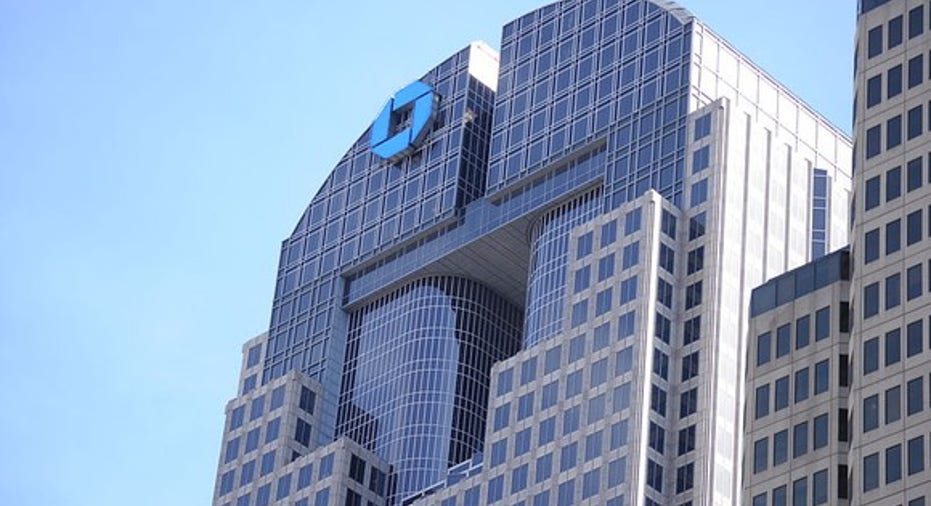3 Key Facts About JPMorgan Chase

Image source: Wikimedia Commons.
If you're thinking about investing in JPMorgan Chase (NYSE: JPM), then you'll want to know a few things about the New York City-based bank. The three points below are a good place to start.
1. JPMorgan Chase is massive
The first thing investors should know about JPMorgan Chase is that it's huge. The $2.5 trillion worth of assets on its balance sheet ranks it first among banks in the United States in terms of size.
JPM Total Assets (Quarterly) data by YCharts.
And the assets on JPMorgan's balance sheet tell only half the story. It also exercises control over $24 trillion worth of its clients' assets. Most of these are assets under custody, held for corporate and institutional investor clients. The remainder, $2.5 trillion, are assets under management or held by wealthy people in various types of accounts, such as brokerage accounts.
The reason it's important to know about JPMorgan Chase's size is because it weighs directly on the bank's performance. Thanks to new laws and regulations passed since the financial crisis, the nation's biggest banks must hold more capital than their smaller, simpler peers. This reduces a bank's leverage, which weighs on profitability.
In JPMorgan Chase's case, it has to hold 3.5% more capital relative to its assets than your standard regional bank. This, combined with other regulations that apply specifically to the biggest banks, puts JPMorgan Chase and other multitrillion lenders at a competitive disadvantage relative to competitors in the regional banking space.
2. It's a universal bank
Another central point that investors should know about JPMorgan Chase is that it's a universal bank. This means that it operates both an investment and commercial bank. Holding all else equal, this makes JPMorgan Chase riskier than a bank that focuses on collecting deposits and making loans, as a traditional commercial bank does.
The risk comes from an investment bank's trading operations. This was on display four years ago, when JPMorgan Chase lost $6 billion from a wrong way bet on the value of derivatives tied to the health of American corporations. The incident, known as the London Whale, cost chairman and CEO Jamie Dimon his 2012 bonus and nearly his job as well.
Investment banks with trading businesses must allocate a larger share of their asset portfolios to safe and highly liquid assets, such as government bonds, as opposed to higher-yielding consumer and commercial loans. Regulators require this to offset the risk that incidents like the London Whale scandal present. The downside is that it drives down the yield on a bank's asset portfolio, as government bonds are less profitable than loans.
3. It's run by a very good banker
The last thing that investors in JPMorgan Chase should know is that it's run by one of the best bankers of the current generation. Dimon cut his teeth working for the mastermind behind Citigroup, formed in 1998 when financier Sanford Weill initiated a merger between Citicorp and Travelers Group, which has since spun off on its own once again.
Soon after the merger, Dimon was fired by Weill for refusing to promote Weill's daughter. Dimon was then hired to turnaround Ohio-based Bank One, the sixth biggest bank in the country at the time, which later merged with JPMorgan Chase. That's how Dimon found his way to the $2.5 trillion bank.
Things could always change, but for the time being JPMorgan Chase investors can rest easy knowing that the 60-year-old executive is at the helm and doesn't seem intent on going anywhere anytime soon.
A secret billion-dollar stock opportunity The world's biggest tech company forgot to show you something, but a few Wall Street analysts and the Fool didn't miss a beat: There's a small company that's powering their brand-new gadgets and the coming revolution in technology. And we think its stock price has nearly unlimited room to run for early in-the-know investors! To be one of them, just click here.
John Maxfield owns shares of Bank of America and Wells Fargo. The Motley Fool owns shares of and recommends Wells Fargo. The Motley Fool has the following options: short October 2016 $50 calls on Wells Fargo. The Motley Fool recommends Bank of America. Try any of our Foolish newsletter services free for 30 days. We Fools may not all hold the same opinions, but we all believe that considering a diverse range of insights makes us better investors. The Motley Fool has a disclosure policy.



















